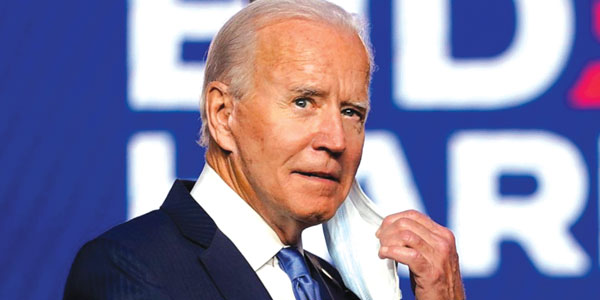
MIAMI — The restrictive policies of the Trump administration, combined with the coronavirus pandemic, have reduced migration to the United States to its lowest level in decades.
However, there’s little doubt that more immigrants will start coming once Joe Biden becomes president. And that’s OK. The United States has a historic opportunity to regain its image as a country of immigrants. But it won’t be easy.
It’s no surprise that the end of the racist, anti-immigrant Trump administration would once again make the United States an attractive destination for migrants, particularly considering the challenges many face at home. Of course, immigrants come to the United States from many countries, but half of them are Latin Americans, so that’s whom I’m focusing on.
The Covid-19 pandemic has created the worst economic crisis in Latin America in 120 years — with a 7.7 percent drop in regional gross domestic product, according to the United Nations Economic Commission for Latin America and the Caribbean. Emigrating to the north is the only alternative for many families. The disastrous effects of the pandemic have exacerbated the devastation caused in Central America by Hurricanes Eta and Iota in November, just as it has worsened the violence, inequality and hunger that plague the region. All this would make anyone want to flee.
Leonel Burgos, part of a caravan in Honduras that left for the United States in December, told Univision that Mr. Biden “said he was going to help all immigrants; let’s see if it’s true.” The caravan was dismantled by the Honduran authorities a few days later. “As immigrants, what we ask the president who just won is that he help us — please,” said Juan Fernando Benítez, another member of the caravan.
None of this is new: Whenever there are problems in the south, the dangerous road to the north becomes more enticing. Hunger is stronger than fear.
After the pandemic and the horrors of the Trump era, the United States must return to its historic tradition of receiving foreigners. Doing so will help the country emerge from its economic crisis. Immigrants work the toughest jobs, create employment opportunities for others and give back to their communities. Undocumented immigrants contribute more than $11 billion a year in state and local taxes. Immigrants are an essential part of our multiethnic, multicultural society.
But before the Biden administration can address the challenge of new migrant caravans heading north, it will have to deal with the tens of thousands of asylum seekers, mostly Central Americans, already stranded in Mexico along the U.S. border.
In one of last year’s presidential debates, Mr. Biden criticized the Trump policy that requires those seeking asylum to wait in Mexico while their claims are processed. “This is the first president in the history of the United States of America that anybody seeking asylum has to do it in another country,” Mr. Biden said. Now those refugees will be his problem. If he wants to be the anti-Trump president, Mr. Biden will have to resolve this situation promptly and humanely.
The incoming administration has already sent the message that it will be much more welcoming to immigrants — and not only those seeking to enter the United States, but also those who are already here. The administration has a long list of promises to fulfill in its first 100 days, from legalizing America’s approximately 11 million undocumented immigrants and protecting Dreamers to granting temporary protected status to the hundreds of thousands of Venezuelans living in the United States who escaped Nicolás Maduro’s regime.
Mr. Biden’s immigration proposals stand in stark contrast to policies imposed by President Trump. In a recent interview with the Washington Examiner, a conservative outlet, Ken Cuccinelli, the acting deputy secretary of homeland security, estimated that up to 140,000 immigrants could cross the border each month under Mr. Biden. “I mean, you saw the ‘Trump effect’ when President Trump came into office,” Mr. Cuccinelli said. “You’re going to see the ‘Biden effect’ as well. And it’s going to be the opposite. And they’re feeding that, and it’s really bad for America. It’s going to be a humanitarian problem, particularly in the midst of Covid.”
The Central American migrant caravans and the situation in Mexico’s refugee camps could become the Biden administration’s first major international crises. The president-elect has a $4 billion investment plan to create jobs in Central America and prevent more people from migrating to the United States to look for work — though this plan isn’t going to have an effect in the region anytime soon.
As long as there aren’t enough Covid-19 vaccines for everyone, it’s unlikely the Biden administration will allow a massive influx of refugees and asylum seekers into the country. These months of vaccine scarcity will hopefully provide the administration the time it needs to formulate and execute a new immigration policy that can address the crisis.
But there is little time to maneuver, and congressional negotiations won’t be easy. Mr. Biden and his nominee for secretary of homeland security, Alejandro Mayorkas — a Cuban-born immigrant — will have to deal simultaneously with the urgency of the caravans and those barely surviving in Mexico’s camps. They’ll also have to deal with the unauthorized immigrants who have been in the United States for decades, waiting for their status to be regularized.
Mr. Biden shouldn’t build walls or separate immigrant families or bar migrants from Muslim-majority countries, as Mr. Trump has. Good leaders are defined by how they treat the most vulnerable in their charge, not the wealthiest or most powerful. And immigrants are, by far, the most vulnerable.
Yes, there will be more immigrants in the United States with Mr. Biden in the White House. Under Mr. Trump, annual net immigration fell to just 595,000 people, the fewest since the 1980s, according to the Brookings Institution. In the two years immediately preceding the Trump presidency, the United States saw net immigration of more than one million people annually.
That’s the United States I recognize and admire, the one that allowed me to become a citizen — and the one that almost disappeared during the Trump administration. Now what I want above all else is for the immigrants who come after me to have the same opportunities and freedoms I’ve had.
Con Biden vendrán más inmigrantes (y eso está bien)
MIAMI, Estados Unidos — Donald Trump y el coronavirus redujeron la migración a Estados Unidos a los niveles más bajos en décadas.
Con Joe Biden en la Casa Blanca, sin duda, vendrán nuevos inmigrantes. Y eso está bien. Estados Unidos tiene una oportunidad histórica de recuperar su imagen como un país de inmigrantes. Pero el arranque no será fácil.
No sería ninguna sorpresa que con el fin de la racista y antiinmigrante era de Trump, Estados Unidos se vuelva a considerar un buen destino para personas que, considerando los desafíos que muchos enfrentan en casa, optan por migrar. Claro, los inmigrantes vienen a Estados Unidos desde diversos países, pero la mitad son latinoamericanos, así que aquí me enfocaré en ellos.
La pandemia del coronavirus, de acuerdo con la Comisión Económica para América Latina y el Caribe de las Naciones Unidas, ha creado la peor crisis en América Latina en 120 años y ha generado una caída del producto interno bruto regional del 7,7 por ciento. Por esto, emigrar al norte es la única alternativa para muchas familias. Los efectos desastrosos de la COVID-19 se suman a la devastación causada en Centroamérica por los huracanes Eta e Iota y a los problemas de la violencia, desigualdad y hambre. Eso expulsa a cualquiera.
Leonel Burgos, quien formó parte de una caravana que salió de Honduras rumbo a Estados Unidos en diciembre, le dijo a Univision que Biden ha hablado sobre “ayudar a todos los inmigrantes, vamos a ver si es cierto”. Esa caravana fue desmantelada por las autoridades hondureñas unos días después. “Lo que nosotros pedimos como inmigrantes es que el presidente que entró ahorita, por favor, nos ayude”, dijo Juan Fernando Benítez, otro de los integrantes de la caravana.
Esto no es nuevo: cada vez que hay problemas en el sur, se reabre el tortuoso y peligroso camino al norte. El hambre es más fuerte que el miedo.
Tras el fin de la pandemia y de los horrores de la era Trump, Estados Unidos también debe regresar a la normalidad y volver a su tradición histórica de recibir extranjeros. Nos ayudarán a salir de la actual crisis económica. Los inmigrantes hacen los trabajos más difíciles, crean empleos, pagan impuestos —se estima que los inmigrantes no autorizados pagan más de 11.000 millones de dólares en impuestos locales y estatales al año— y son una parte esencial de nuestra sociedad multiétnica y multicultural.
Pero antes de enfrentar el desafío de las nuevas caravanas provenientes de Honduras, Guatemala y El Salvador, el gobierno de Biden tendrá que lidiar con las decenas de miles de solicitantes de asilo, en su mayoría centroamericanos, que ya esperan en México, junto a la frontera de Estados Unidos.
En uno de los debates presidenciales, Biden criticó la política del presidente Trump que obliga a los solicitantes de asilo esperar en México. “Este es el primer Presidente en la historia de Estados Unidos que hace que alguien que solicita asilo tenga que esperar en otro país”, dijo Biden. Ahora, ese será su problema. Si Biden quiere ser el reverso de Trump tendrá que ayudar a resolver la situación de estos refugiados con prontitud y con una actitud humanitaria. Han sido rechazados de todos lados y su última esperanza es Estados Unidos.
El próximo gobierno ya ha enviado el mensaje de que será mucho más generosa con los inmigrantes, no sólo con los que vienen sino también con los que ya están aquí. Hay una larga lista de promesas para los primeros cien días de gobierno, desde presentar una propuesta de ley para ofrecer vías a la ciudadanía a alrededor de 11 millones de personas indocumentadas y proteger a los dreamers hasta darle el estatus de protección temporal (TPS, por su sigla en inglés) a cientos de miles de venezolanos que viven en Estados Unidos que salieron de su país huyendo del régimen de Nicolás Maduro.
Las propuestas migratorias de Biden contrastan radicalmente con las políticas impuestas por Trump. En una reciente entrevista con el medio conservador Washington Examiner, Ken Cuccinelli, el funcionario designado por Trump para liderar los Servicios de Inmigración y Ciudadanía (USCIS), calculó que hasta 140.000 inmigrantes podrían estar cruzando la frontera cada mes con Biden en la Casa Blanca. “Vimos el ‘efecto Trump’ cuando llegó a la presidencia”, dijo. “Y ahora van a ver el ‘efecto Biden’. Va a ser lo opuesto. […] Va a ser muy malo para Estados Unidos. Va a ser un problema humanitario, particularmente en medio de la COVID”.
Las caravanas de migrantes centroamericanos y la situación de los solicitantes de asilo en los campos de refugiados en México podrían convertirse en la primera crisis internacional de Biden. El Presidente electo tiene una estrategia de 4.000 millones de dólares para mejorar las condiciones en Centroamérica y así evitar que las personas de la región que solían migrar a Estados Unidos no lo tengan que hacer. Y eso va a tomar años.
Mientras no haya vacunas contra la COVID-19 para todos, es poco probable que el gobierno de Biden permita la entrada masiva de refugiados y de solicitantes de asilo. Es de esperar que estos primeros meses del año, mientras persista la escasez de vacunas, le den un colchón al nuevo gobierno para formular y ejecutar una política de inmigración que pueda abordar la crisis.
Pero hay poco tiempo para maniobrar y las negociaciones en el Congreso no serán fáciles. Biden y su nominado para ser el próximo secretario del Departamento de Seguridad Nacional, Alejandro Mayorkas, un inmigrante nacido en Cuba, tendrán que vérselas simultáneamente con la urgencia de las caravanas y de los que apenas sobreviven en los campos de refugiados en México, junto a la esperanza de quienes llevan décadas esperando una regularización de su estatus migratorio dentro del país.
El gobierno de Biden no debe ser de muros, jaulas, separaciones de familias, miedo y prohibiciones de entrada a ciudadanos de países predominantemente musulmanes, como fue el de Trump. Los buenos gobernantes no se definen por la manera en que tratan a los más ricos, sino por su trato hacia los más vulnerables. Y los inmigrantes son los más vulnerables.
Sí, con Biden habrá más inmigrantes en Estados Unidos. Con Trump, el número de inmigrantes bajó a solo 595.000 en un año (de 2018 a 2019), la cifra más baja desde los años ochenta, según un análisis del Instituto Brookings. Y contrasta con los dos años inmediatamente anteriores a la llegada de Trump, cuando Estados Unidos autorizó la entrada de más de un millón de inmigrantes anualmente.
Ese es el Estados Unidos que reconozco y admiro, el que yo escogí como país y que me permitió hacerme ciudadano, y que casi desapareció durante la presidencia de Trump. Lo que ahora más quiero es que los inmigrantes que llegaron después de mí tengan las mismas oportunidades y libertades que yo tuve.









